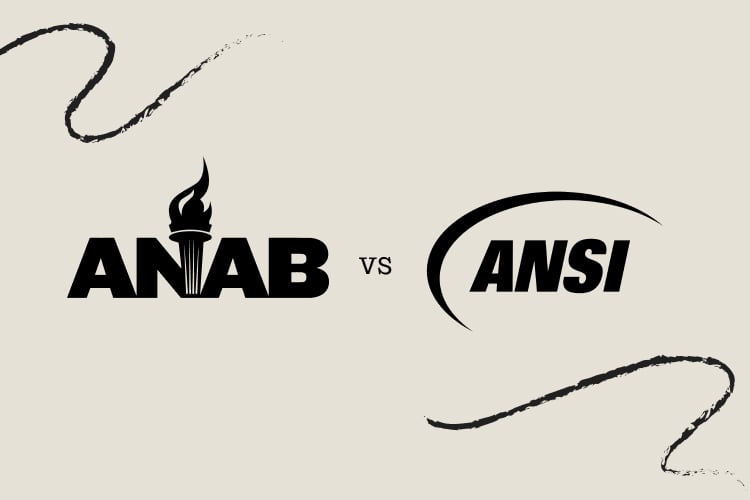At times, it might seem like the foodservice industry is a bit like alphabet soup. From FDA to 86 to TLDR to the USDA, there are all kinds of words and phrases thrown around that can be a bit overwhelming to keep track of.
A common source of confusion when it comes to training and its requirements is the difference between ANAB and ANSI–and how they relate to the food industry.
In this post, we'll explain the differences between the two and how they impact the food industry, so you can confidently get back to business! Here's what we'll cover:
Why do these organizations matter to the food industry?
What is the difference between ANAB and ANSI?
ANAB Accreditation vs. ANSI Accreditation
Is ANSI the same as ANAB?
ANSI and ANAB are not the same organization, although they are often confused. Truth be told, the two are closely related: ANAB is a nonprofit subsidiary of ANSI. While the two go hand in hand, there are a few key differences to be aware of.
American National Standards Institute (ANSI)
The American National Standards Institute (ANSI) is "a private nonprofit organization that supervises and manages the US voluntary standards and conformity assessment system." In layman's terms, ANSI provides organizations with a framework for setting fair standards within any industry.1
Where do they do this? This organization acts as a neutral venue and voice for coordinating industry-wide standards for products, services, and personnel in the United States. These standards are intended to promote uniformity among businesses and organizations within a given industry or sector.
To become certified by ANSI means that an organization has met the criteria set forth by this body.
ANSI National Accreditation Board (ANAB)
ANAB stands for the ANSI National Accreditation Board. This organization provides extensive accreditation services as well as training programs and resources to organizations that fall within both the private and public sectors.
As part of the process of becoming accredited by ANAB, an organization must demonstrate compliance with international standards for quality management systems, safety management systems, and environmental management systems. In addition to this, organizations must also have policies and procedures in place to ensure their ongoing compliance with these standards.
The relationship between ANSI and ANAB
Both organizations rely on each other heavily and have integrated purposes. The goal of both is to facilitate communication among organizations that develop standards. However, ANAB, as a subsidiary of ANSI, is the body that’s responsible for actually doing all the accreditation.
It is important to note that while some organizations may be accredited by both ANAB and ANSI, they are not interchangeable; each accreditation denotes a different level of recognition or certification. You can’t say that something is ANSI-accredited. It is ANAB-accredited.
Again, ANSI focuses on coordinating US standards with international standards, while ANAB provides specific accreditation services and training to organizations in various industries across multiple countries.
The two accreditations serve different roles but work together to ensure safety within industries across the US and internationally.
Both types of accreditations are required by many industries so companies can prove their reliability and compliance with certain standards. By obtaining both accreditations, organizations can further demonstrate their commitment to meeting high safety requirements in order to protect their customers from harm or risk associated with their services or products.
Why do these organizations matter to the food industry?
Are you curious to know about the role that ANAB and ANSI play in the food industry?
Both ANSI and ANAB play a critical role in ensuring an exceptional level of professionalism and competence across the food production, processing, and service spectrum.
Accredited training provides accurate and up-to-date information, adherence to higher standards, and a universal language that unifies the food industry, instilling trust and confidence in both professionals and consumers.
For those working in the food industry, obtaining accredited training means gaining a comprehensive understanding of regulatory requirements, industry best practices, and food safety management systems.
Consequently, organizations that employ professionals who have taken accredited trainings send a strong message to their stakeholders, investors, consumers, and regulatory authorities that they prioritize quality and food safety above anything else.
By conferring accreditation upon qualified certification bodies, ANAB drives consistent and robust evaluation of management systems, which in turn strengthens public trust in an organization's commitment to food safety.
If every organization or professional in the food industry follows different standards or frameworks, it will create confusion and compromise the reliability of the systems in place.
ANAB’s accreditation process helps establish a common language and set of guidelines in the food industry, paving the way for effective communication, collaboration, and consistent expectations among stakeholders at the local, national, and global levels.
The accreditation process provides impartial and transparent evaluation procedures, fostering confidence in an organization's dedication to maintaining a high-quality and safe environment for food production.
What is the difference between ANAB and ANSI?
Still confused? Let's break things down a bit more.
The biggest difference: purpose
The biggest difference between ANAB and ANSI is their purpose.
While both organizations provide accreditation services, ANSI focuses more on providing standards, while ANAB provides more specialized accreditations such as food safety auditing or laboratory accreditation. ANSI sets the standards, while ANAB focuses on the accreditation process itself.
ANAB offers professional accreditation services, a customer-focused process, and training.
ANAB is an accreditation body recognized by the International Accreditation Forum (IAF) with offices in both the United States and Canada. Again, it is a subsidiary of ANSI.
It is responsible for accrediting:
-
Calibration/testing laboratories
-
Proficiency test providers
-
Forensic test/calibration service providers
-
Inspection bodies
-
Producers of reference materials
-
Certification bodies for management systems
…and others.
In addition to offering professional accreditation services and a customer-focused accreditation process, ANAB also provides training seminars on topics such as auditing techniques and risk assessment.
ANSI is responsible for the creation of standards
ANSI serves as a forum for coordinating voluntary standards development activities throughout the world, while ANAB is primarily focused on accreditations. ANSI acts as an umbrella organization for standards development around the world, within which ANAB falls.
These organizations for standards development include:
-
Government agencies such as ASTM International or the American Society of Mechanical Engineers (ASME)
-
Private corporations such as Underwriters Laboratories (UL)
-
Industry associations such as The Telecommunications Industry Association (TIA)
-
Trade associations such as The National Electrical Contractors Association (NECA)
-
Public health groups such as The World Health Organization (WHO)
-
Educational institutions like Harvard University
…and so on.
The standards developed by these organizations are then reviewed by an independent panel of experts before being approved by ANSI for adoption into US law or practice.
ANAB Accreditation vs. ANSI Accreditation
A letter was recently sent out to clients with, or seeking, ANAB accreditation regarding the difference between ANSI and ANAB. It stated that all clients had until January 2025 to transition to ANAB accreditation symbols but that all textual claims related to accreditation must reference ANSI National Accreditation Board (ANAB) Accreditation instead of ANSI.
The reason? It's misleading to claim that you are providing services under ANSI accreditation when instead, it's under ANAB.
This might seem like a simple turn of phrase, but it's important to understand the difference in verbiage. Again, ANSI provides accreditation and training for all kinds of industry-specific certification programs.
ANSI certification is, essentially, proof that you have complied with the accreditation standard known as ANSI/ISO/IEC 17024. It shows that you have a certification in the industry you're pursuing. This is something that is valuable for employers, recruiting managers, and other industry leaders to see with individual staff members.
It can:
-
Reduce liability insurance cost
-
Ensure that you've received appropriate training
-
Show that you had a reliable assessment to prove that you can provide specific skills or areas of expertise
Again, ANAB does not provide standards - only ANSI does. The ANAB logo is for use only by ANAB and not any other entity. ANSI certifications fall under ANAB credential programs, previously ANSI programs. ANAB also accredits organizations that provide foodservice training courses and certificates.2 While these two organizations have two different purposes, understanding their work can help you identify what you need to run your business.
Sources:
- ANSI: Home Page
- ANAB: Personal Credentialing





.png)

.png)
